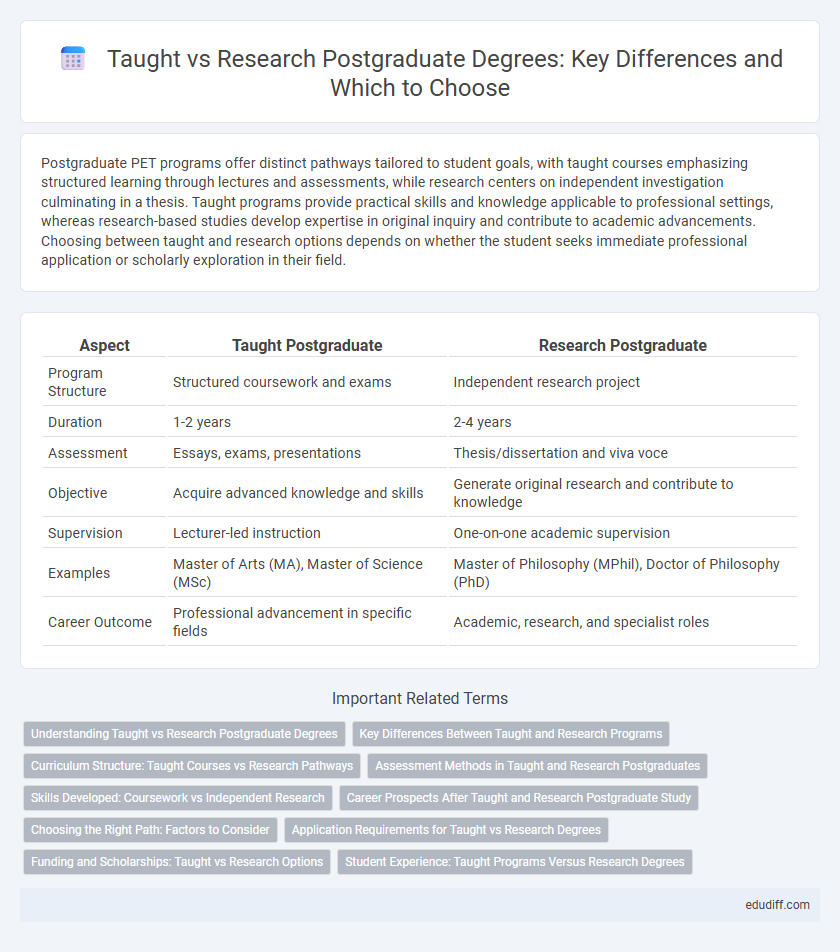Postgraduate PET programs offer distinct pathways tailored to student goals, with taught courses emphasizing structured learning through lectures and assessments, while research centers on independent investigation culminating in a thesis. Taught programs provide practical skills and knowledge applicable to professional settings, whereas research-based studies develop expertise in original inquiry and contribute to academic advancements. Choosing between taught and research options depends on whether the student seeks immediate professional application or scholarly exploration in their field.
Table of Comparison
| Aspect | Taught Postgraduate | Research Postgraduate |
|---|---|---|
| Program Structure | Structured coursework and exams | Independent research project |
| Duration | 1-2 years | 2-4 years |
| Assessment | Essays, exams, presentations | Thesis/dissertation and viva voce |
| Objective | Acquire advanced knowledge and skills | Generate original research and contribute to knowledge |
| Supervision | Lecturer-led instruction | One-on-one academic supervision |
| Examples | Master of Arts (MA), Master of Science (MSc) | Master of Philosophy (MPhil), Doctor of Philosophy (PhD) |
| Career Outcome | Professional advancement in specific fields | Academic, research, and specialist roles |
Understanding Taught vs Research Postgraduate Degrees
Taught postgraduate degrees typically involve structured coursework, scheduled lectures, and assessments designed to build foundational knowledge and practical skills in a specific discipline. Research postgraduate degrees emphasize independent study, original research, and the production of a thesis that contributes new insights to the academic field. Understanding the distinction between these pathways helps students align their educational goals with either practical application or academic advancement.
Key Differences Between Taught and Research Programs
Taught postgraduate programs emphasize structured coursework, scheduled lectures, and continuous assessments to develop practical skills and theoretical knowledge. Research programs prioritize independent study, original research projects, and the production of dissertations or theses that contribute new insights to the academic field. The key differences lie in the mode of learning, evaluation methods, and the balance between knowledge acquisition and knowledge creation.
Curriculum Structure: Taught Courses vs Research Pathways
Taught postgraduate courses feature a structured curriculum with scheduled lectures, seminars, and assessments designed to build comprehensive knowledge across core and elective modules. Research pathways prioritize independent investigation, requiring students to propose, design, and complete original studies under academic supervision without mandatory coursework. Curriculum structures in taught programs emphasize breadth and consistency, while research pathways focus on depth, critical analysis, and contribution to academic knowledge.
Assessment Methods in Taught and Research Postgraduates
Taught postgraduate programs primarily use continuous assessment methods such as exams, coursework, presentations, and group projects to evaluate student understanding and application of knowledge. Research postgraduate assessment centers on the quality and originality of a thesis or dissertation, supplemented by progress reports and viva voce examinations to assess critical thinking and research methodology skills. The distinct assessment approaches align with the structured learning outcomes of taught courses versus the independent, inquiry-driven nature of research degrees.
Skills Developed: Coursework vs Independent Research
Postgraduate taught programs emphasize structured coursework, developing skills in critical analysis, time management, and collaborative communication through guided learning and assessments. Research-focused postgraduate studies cultivate independent problem-solving, advanced research methodologies, and innovative thinking by requiring students to design and execute original projects. Mastery of academic writing and data interpretation is integral to both pathways, enhancing overall expertise in the chosen discipline.
Career Prospects After Taught and Research Postgraduate Study
Taught postgraduate programs, such as master's degrees, often lead to immediate career advancement through practical skills and professional qualifications highly valued in industries like business, healthcare, and education. Research postgraduate study, including PhDs, prepares graduates for academic, scientific, and specialized research roles that demand analytical expertise and contribute to innovation in fields like engineering, social sciences, and technology. Employers typically seek taught postgraduate graduates for applied roles, while research postgraduates excel in roles requiring in-depth investigation and development of new knowledge.
Choosing the Right Path: Factors to Consider
Choosing between taught and research postgraduate programs depends on career goals, learning preferences, and desired skills development. Taught programs emphasize structured coursework and practical knowledge ideal for professional advancement, while research degrees focus on independent investigation and contribute to academic or scientific fields. Evaluating factors such as time commitment, assessment style, and intended career trajectory is essential for selecting the right postgraduate path.
Application Requirements for Taught vs Research Degrees
Taught postgraduate degrees typically require evidence of prior coursework completion, such as transcripts and standardized test scores, along with personal statements and references emphasizing academic skills and motivation. Research degrees demand a detailed research proposal, supervisor endorsements, and demonstration of relevant research experience or academic publications. Both pathways often require proof of English language proficiency and meeting specific institutional entry criteria.
Funding and Scholarships: Taught vs Research Options
Funding options for postgraduate taught programs typically include university scholarships, government grants, and employer sponsorships geared towards course fees and living expenses. Research postgraduate students often have access to specific scholarships, such as doctoral stipends, research council funding, and thematic grants that support extensive project work and field studies. The availability and competitiveness of funding vary by discipline and institution, with research degrees generally offering more project-based financial support.
Student Experience: Taught Programs Versus Research Degrees
Taught postgraduate programs offer structured coursework and regular assessments, providing students with clear learning objectives and continuous academic support that enhance skill acquisition. Research degrees emphasize independent study, critical thinking, and original contribution to knowledge, fostering deep intellectual engagement and self-directed learning. Students in taught programs benefit from collaborative environments and immediate feedback, while research students experience flexible timelines that encourage in-depth exploration of specialized topics.
Taught vs Research Infographic

 edudiff.com
edudiff.com